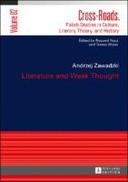Explore

This book is a reconstruction and presentation of the fundamental assumptions of the so-called weak thought, as elaborated mainly by the Italian hermeneutical philosopher Gianni Vattimo and the Romanian philosopher Constantin Noica in his ontology. Both Noica and Vattimo focus on all that is existentially fragile, deficient, crippled or defective. The way in which weak being manifests itself can be best expressed by using the concept of the trace. Some motifs of weak thought serve to reinterpret certain fundamental concepts of poetics, firstly, the concept of mimesis, treated here as a kind of tracing, and secondly, the concept of the textual subject as a trace. The book also describes these tendencies in modern literature in which the intuition of weak being has most fully expressed itself. In general terms, this intuition is that of a reality that has lost its substantiality and essentiality. This intuition is most frequently expressed by the motif of the trace in its various different meanings: as the imprint, the remnant, the sign-message.
This book is included in DOAB.
Why read this book? Have your say.
You must be logged in to comment.
Rights Information
Are you the author or publisher of this work? If so, you can claim it as yours by registering as an Unglue.it rights holder.Downloads
This work has been downloaded 34 times via unglue.it ebook links.
- 34 - pdf (CC BY-NC-ND) at OAPEN Library.
Keywords
- Andrzej
- Literature
- Mimesis
- Modern Literature
- Teresa
- thema EDItEUR::D Biography, Literature and Literary studies::DS Literature: history and criticism::DSB Literary studies: general
- thema EDItEUR::Q Philosophy and Religion::QD Philosophy::QDT Topics in philosophy::QDTN Philosophy: aesthetics
- thought
- Trace
- Walas
- Weak
- Zawadzki
Links
DOI: 10.3726/978-3-653-03589-6Editions

